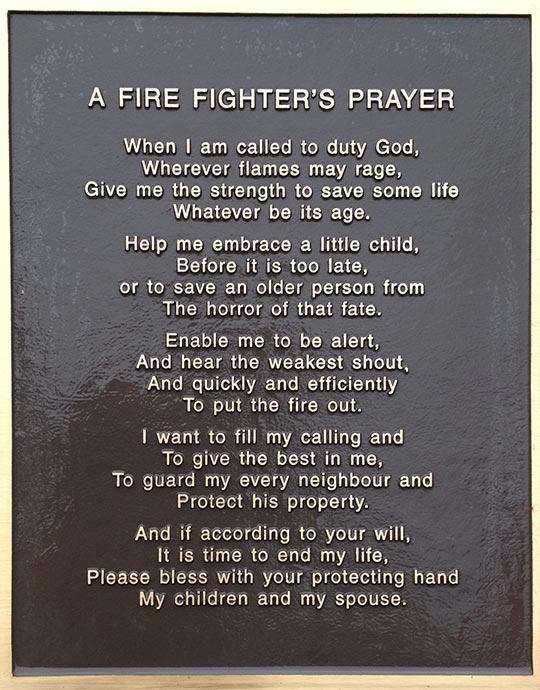
Every day I walk past the Ontario Fire Fighter Memorial on the northeast corner of College & University. I’m grateful for the service these people perform. I’m also astonished at the sacrifice they make in performing that service. Every year new names appear on the marble blocks surrounding a bronze statue of a fire fighter rescuing a child. Every year, people gather to remember the fallen. In front of the memorial is a bronze plaque displaying the Fire Fighter’s Prayer. Although most versions print it as anonymous, it appears to have been written by A.W. Smokey Linn, who joined the fire department of Wichita, Kansas in 1947. The earliest known appearance of the poem is in a 1958 anthology. It’s a sentimental piece that draws on a generic religiosity.
Most days, I walk past and ignore the monument in my hurry to get from one place to another, but a couple weeks ago, I was walking with a friend who is more observant than me. He paused to read the text and I joined him. At the risk of sounding sacrilegious, the two of us started to laugh by the end of it. The final line has obviously been altered to accommodate the fact that, since the poem’s writing, more and more women have joined the profession. While the alteration is well-intended, it destroys the rhyming scheme.
I read this as a collision of sacred texts. On the one hand, we have the fire fighter’s prayer, which has assumed an almost liturgical status. Since its writing, it has proliferated like a weed. It’s everywhere. It expresses an experience that all fire fighters can relate to, and so it pretty much has to be included in everything, from services to memorial plaques to personal reminders. On the other hand, we have a sacred text of a different sort–the provincial laws and regulations that require our official texts to be gender neutral.
I imagine them duking it out in a ring somewhere. Poetry is supposed to be the referee, but sometime in the 10th round, a stray fist goes flying and mashes Poetry’s nose. There’s blood everywhere. The fight goes on but no one thinks to call in a new referee.